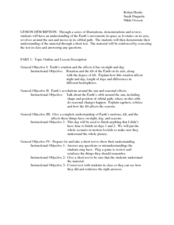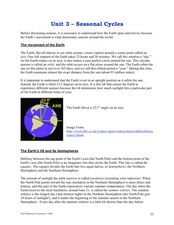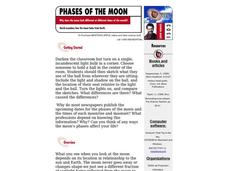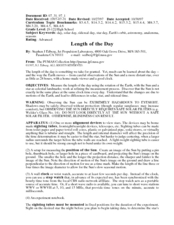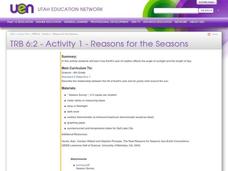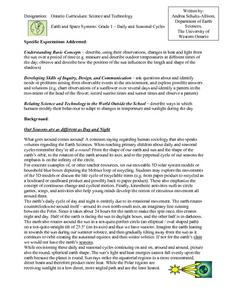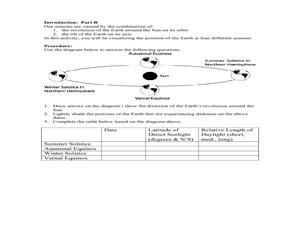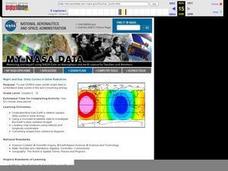Curated OER
Earth's Movement in Space
Students explain how the Earth's tilt and rotation causes night and day. In this earth science lesson, students determine how seasonal changes are caused by Earth's revolution. They play a jeopardy team game at the end of the unit to...
Curated OER
Seasonal cycles
Students understand that the rotation of the Earth is responsible for the seasons. In this seasonal cycles lesson, students learn how the rotation of the Earth affects the seasons. Students answer questions about the rotation, the...
Curated OER
The Four Seasons - Earth's Axis
Middle schoolers explain that it is the tilt of earth's axis that causes the seasons. They engage in a variety of activities, both teacher-led and on the computer, which enable them to further explain how the Earth's axis affects the...
Curated OER
Modeling the Change of Seasons
Students evaluate data to determine changes in length of day. They model the revolution of Earth around the sun to show changes in length of day and sun angle and illustrate how the sun angle affects the change of season.
Curated OER
Phases of the Moon
Young scholars explore why when you examine the moon depends on its location in relationship to the sun and Earth. The moon never goes away or changes shape-we just see a different fraction of sunlight being reflected from the moon to...
Curated OER
Tilted Earth
What causes Earth's seasons? Find out through a series of anticipatory questions, an easy yet powerful activity representing the sun-Earth system, a diagram to label, and follow-up questions. Dispel the misconceptions about Earth being...
Curated OER
Sundials and Shadows - What Can They Teach Us About Seasons?
Pupils collect and analyze data relating to seasonal changes. They view a video, research web sites and build a sundial to collect their data.
Curated OER
Science Videos
Students plan, practice, and act in a 2-3 minute videotaped production about a specific topic. Students from a local high school give presentations pertaining to seasons, earth rotation, and moon phases. Students analyze the...
Curated OER
What Orbital Dynamic Variables are Responsible for Earth's Weather?
Students explore the changing of the seasons. In this astronomy and seasons instructional activity, students construct a model of the revolution of the sun and the moon. Students compare the recorded solstice/equinox orbital positions...
Curated OER
Length of the Day
Students investigate how the Earth's rotation affect the length of day. In this earth science lesson, students construct a sighting apparatus and record their observations over a few days. They analyze data collected and formulate a...
Curated OER
Modeling the Seasons
Learners explore the seasons and their attributes. For this geography lesson, students create a 3-D model of the Earth that showcases the elliptical travel of the Earth that causes seasons.
Space Awareness
Climate Zones
The climate at the equator is hotter than the climate at the poles, but why? The lesson plan goes in depth, explaining how the angles of illumination relate to the heating rate at different latitudes and seasons. Scholars use a strong...
Curated OER
Apparent Motion of the Sun
Demonstrate the path of the sun across the sky at different times of the year with an engaging science lesson. Learners use a series of questions and diagrams to examine the movement of the sun and appearance of the sky around their...
Curated OER
The Four Seasons - Earth's Axis
Young scholars discover that it is the tilt of the earth's axis that results in the seasons. They clarify common misconceptions about the earth's orbit around the sun.
Curated OER
The Sun Affects Earth
Third graders read, write, and listen to information about the sun and its effects on the Earth.as it relates to its axis, orbit, rotate, and revolution. In this solar system lesson, 3rd graders examine how the sun effects the Earth's...
Curated OER
Reasons for the Seasons
Sixth graders conduct and analyze a survey that explores public perceptions about the reasons for seasonal change. They measure the changing length of days, observe shadows and discuss how the Earth's axis of rotation affects the seasons.
Curated OER
Reasons for the Seasons
Students discover how the Earth's axis of rotation affects the angle of sunlight and the length of day. They take a survey and give the survey out to family members and friends. They tally their findings and then determine the correct...
Curated OER
Earth and Seasons
Sixth graders comprehend that the path Earth takes as it revolves around the sun is called its orbit. They also comprehend that the axis is an imaginary line that passes through Earth's center and its North and South Poles. Students...
Curated OER
Science: Daily and Seasonal Cycles
First graders use their observations to describe daily and seasonal cycles. through a demonstration using a suspended ball and flashlight, they determine the time of day in various locations. Next, 1st graders participate in a...
Curated OER
The Earth-Sun-Moon System
Third graders construct a model of the earth-sun-moon system using students as the sun, moon, and earth. They discuss ways that time is related to the movement of the earth and moon.
Curated OER
Suns Path and Seasons
Using a plastic dome to represent the hemisphere of the sky, your class is able to demonstrate the path of the sun at different points of the day and year. They use a protractor to record movement and answer questions about elapsed...
Curated OER
NIGHT AND DAY: DAILY CYCLES IN SOLAR RADIATION
High schoolers examine how Earth's rotation causes daily cycles in solar energy using a microset of satellite data to investigate the Earth's daily radiation budget and locating map locations using latitude and longitude coordinates.
National Wildlife Federation
Summer Midnight Sun
Sunlight hours and climate have a clear connection. Young researchers collect data about the sunrise and sunset times in an Arctic climate as well as the average temperatures. They then graph their data to make connections between the...
Curated OER
In a Giants Garden
Learners explore the effect of the earths rotation and its relationship to the suns position and the effect that the longer and shorter amount of daylight has on a pumpkin plant which they have planted.


